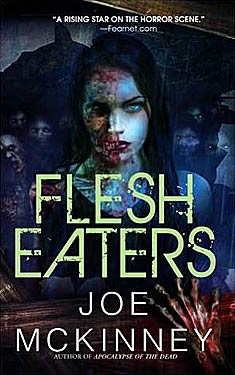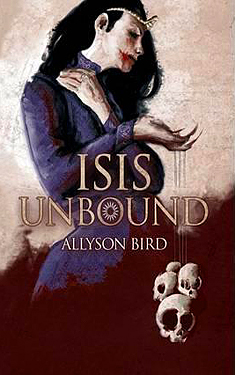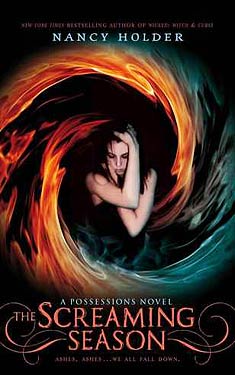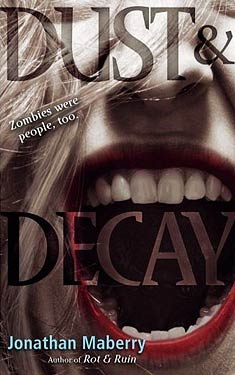GMRC Review: Fahrenheit 451 by Ray Bradbury
 Scott Lazerus came to Worlds Without End looking for a good list of books. He found David Pringle’s Best 100 Science Fiction Novels list to his liking and is currently working his way through the list. He has posted a bunch of reviews for WWEnd including this latest review for the GMRC.
Scott Lazerus came to Worlds Without End looking for a good list of books. He found David Pringle’s Best 100 Science Fiction Novels list to his liking and is currently working his way through the list. He has posted a bunch of reviews for WWEnd including this latest review for the GMRC.
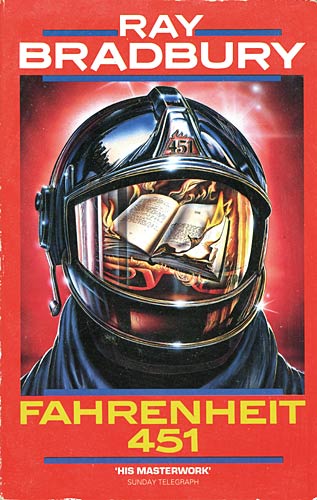 Ray Bradbury’s The Illustrated Man and Fahrenheit 451 are two of the earliest SF books I remember reading, around age ten, probably because they were the only science fiction books on my parents’ shelves. Bradbury, then, and Asimov a little later, would be my “gateway drugs” into the genre, and I read everything I could find in the library by both authors at a young age. I remember liking both books, but preferring The Illustrated Man collection, and rereading Fahrenheit 451 today, I have to agree with my ten-year-old self that Bradbury is much better at shorter lengths. Not that Fahrenheit is very long—for a novel, it’s extremely short—but that only makes the limitation more obvious. A simple theme that works well as the basis of a short story can outstay its welcome in a novel, especially if the author fails to engage with the ambiguities and subtleties inherent in it. Much as I was looking forward to rereading this, I ended up surprisingly disappointed. What seemed profound and meaningful to me as a child, now comes across as a problematic and unsubtle screed about the dangers of conformity and mass media. The idea that “the majority,” if given its way, would stamp out individualism, seems unrealistic, and reads now like an unconvincing condemnation of communism. This is prime period Bradbury, however, so my arguments with the novel are often overcome by his striking images and the fascinating strangeness of the world he creates. (Spoilers follow, in case anyone hasn’t read this novel yet!)
Ray Bradbury’s The Illustrated Man and Fahrenheit 451 are two of the earliest SF books I remember reading, around age ten, probably because they were the only science fiction books on my parents’ shelves. Bradbury, then, and Asimov a little later, would be my “gateway drugs” into the genre, and I read everything I could find in the library by both authors at a young age. I remember liking both books, but preferring The Illustrated Man collection, and rereading Fahrenheit 451 today, I have to agree with my ten-year-old self that Bradbury is much better at shorter lengths. Not that Fahrenheit is very long—for a novel, it’s extremely short—but that only makes the limitation more obvious. A simple theme that works well as the basis of a short story can outstay its welcome in a novel, especially if the author fails to engage with the ambiguities and subtleties inherent in it. Much as I was looking forward to rereading this, I ended up surprisingly disappointed. What seemed profound and meaningful to me as a child, now comes across as a problematic and unsubtle screed about the dangers of conformity and mass media. The idea that “the majority,” if given its way, would stamp out individualism, seems unrealistic, and reads now like an unconvincing condemnation of communism. This is prime period Bradbury, however, so my arguments with the novel are often overcome by his striking images and the fascinating strangeness of the world he creates. (Spoilers follow, in case anyone hasn’t read this novel yet!)
Memorable images abound: the woman who refuses to leave when the firemen arrive, preferring to burn with her books; the sensory overload of the “parlor families” and the “thimble-wasp” earplugs (Bradbury’s anticipation of people who are continuously attached to the iPods or cell phones); the stomach-pumping “suction snake” and the mechanical bloodhound, its hypodermic needle moving in and out; the city launched into the air as the homeless intellectuals can only stand and watch. The writing is florid at times, but his use of poetic language is one of the ways that Bradbury’s writing stands out, especially when compared to his fellow SF writers of the early ‘50s.
Bradbury’s rage at the dumbing-down of society is palpable, as he portrays the overwhelming distractions of media and advertising, contrasted with the social distaste for engagement with ideas and people, or for the simple pleasures of everyday existence. This alienation and repression leads to suicide becoming ever more commonplace, mirrored at the societal level by the easy acceptance of self-destructive war. “The Army said so. Quick war. Forty-eight hours they said, and everyone home. That’s what the Army said. Quick war… I’m not worried. It’s always someone else’s husband dies, they say.” (Sound familiar?)
Certainly most are already familiar with the novel’s premise: In the seemingly near future, extreme conformity is the primary value of American society. The role of “firemen” is no longer to put out fires. Buildings have been fireproofed and, in a memorably ironic role-reversal, firemen become fire-starters, responding to reports of secret stashes of illegal books, flamethrowers in hand. For the most part, Americans have not objected to the institutionalized book-burning, agreeing that the profusion of ideas found in them only serves to confuse and distract, creating a potential danger to society, along with discontent and melancholy among individual readers. Better by far to spend leisure time with the jabbering “family” that appears on the mind-numbing high-volume big-screen television programming that has taken the place of engagement with real people and ideas for the vast majority. The constant, gullibly-accepted media bombardment creates a population that no longer questions the decisions of the authorities, nor accepts that they would have the right to ask such questions.
Bradbury’s critique of anti-intellectualism resonates in today’s America, where a significant proportion of the population have no problem rejecting the expert scientific consensus on questions of meteorology and biology, and even refusing to “believe” easily verifiable facts, such as the birthplace and religion of the President. But Bradbury’s concern is not with this type of politically-abetted misinformation, but rather with the sort of dislike schoolchildren can have for the smart kid in the class. When Montag, the fireman protagonist, begins to show signs of questioning his role as a book-burner, his perceptive (and surprisingly well-read) superior, Captain Beatty, recites the party line to him:
“With schools turning out more runners, jumpers, racers, tinkerers, grabbers, snatchers, fliers, and swimmers instead of examiners, critics, knowers, and imaginative creators, the word ‘intellectual,’ of course, became the swear word it deserved to be. You always dread the unfamiliar. Surely you remember the boy in your own school class who was exceptionally ‘bright’ did most of the reciting and answering while the others sat like so many leaden idols, hating him. And wasn’t it this bright boy you selected for beatings and tortures after hours? Of course it was. We must all be alike. Not everyone born free and equal, as the Constitution says, but everyone made equal.”
But the response of Faber, a member of the book-preserving underground, sought out by Montag in his attempt to sort out his newly-discovered rebellious inclinations, also seems problematic: “But remember that the Captain belongs to the most dangerous enemy to truth and freedom, the solid unmoving cattle of the majority. Oh, God, the terrible tyranny of the majority.” But Bradbury isn’t concerned about religious or ethnic minorities; he’s upset that the intellectual minority has been marginalized, and implies that the result of such a “tyranny” of the masses would be a mind-numbingly conformist self-destructive dystopia. John Stuart Mill considered a similar possibility in responding to the new ideas of the Utopian (pre-Marxist) communists in 1848, which he saw as potentially stifling to individualism:
“The question is whether there would be any asylum left for individuality of character; whether public opinion would not be a tyrannical yoke; whether the absolute dependence of each on all, and the surveillance of each by all, would not grind all down into a tame uniformity of thoughts, feelings, and actions…. No society in which eccentricity is a matter of reproach can be in a wholesome state.”
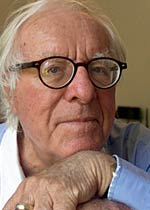 Is Fahrenheit 451 yet another Cold War anti-communist tract? Consider the society Bradbury portrays: television is not just a diversion from more intellectual pursuits; rather, those who enjoy it are portrayed as utter morons. (And the fact that the only characters we see portrayed this way are women doesn’t help.) The complexities of modern urban societies are inherently harmful, with no positive aspects. The normal human urge to conform to a society is not just something to be guarded against, but something which results in mental illness and both individual and social suicidal behavior. It’s not that Bradbury doesn’t bring up a valid concern, and one with which I strongly sympathize, but his heavy-handed and unsubtle extrapolation of the negative aspects of media-driven conformity ultimately grows tiresome and unbelievable. In a short story like “The Pedestrian,” or even the novella “The Fireman,” from which Fahrenheit 451 was expanded, these themes come across as valuable food for thought; expanded to novel length, the lack of nuance starts to become problematic.
Is Fahrenheit 451 yet another Cold War anti-communist tract? Consider the society Bradbury portrays: television is not just a diversion from more intellectual pursuits; rather, those who enjoy it are portrayed as utter morons. (And the fact that the only characters we see portrayed this way are women doesn’t help.) The complexities of modern urban societies are inherently harmful, with no positive aspects. The normal human urge to conform to a society is not just something to be guarded against, but something which results in mental illness and both individual and social suicidal behavior. It’s not that Bradbury doesn’t bring up a valid concern, and one with which I strongly sympathize, but his heavy-handed and unsubtle extrapolation of the negative aspects of media-driven conformity ultimately grows tiresome and unbelievable. In a short story like “The Pedestrian,” or even the novella “The Fireman,” from which Fahrenheit 451 was expanded, these themes come across as valuable food for thought; expanded to novel length, the lack of nuance starts to become problematic.
This interpretation is driven home by the end of the novel, in which the seeming destruction of this society (and most of the population), while portrayed as tragic, also comes across as a sort of necessary cleansing, allowing humanity the hope of potentially going back to a more pristine state. Others may take this differently than I did, but blowing up the world and starting over precludes the possibility of reform or revolutionary change through less apocalyptic means. Bradbury seems to be saying that we brought this on ourselves by abandoning books and ideas in favor of mindless entertainment and meaningless sensory stimulation. We abandoned individualism for conformity and communism. As the cities burn, the non-conformist intellectuals, who have gone into semi-hiding in the countryside, are vindicated. America has not become a dystopia because of the imposition of tyranny by political, intellectual, or economic elites; rather, it is the tyranny of the majority. Democracy has gone too far.
One of the roles of dystopian fiction is that of the cautionary tale, extrapolating from current circumstances to show what might happen “if this goes on.” In this case, though, I think Bradbury undercuts his conclusion (and thus his warning) through his use of hyperbole, and by choosing to end the world without considering the possibility of reforming it. But this is a personal reaction. Others may respond positively to Bradbury’s ideas, and it brings up some fascinating issues that will always be with us. There are rewards to be had here, and there are reasons Fahrenheit 451 is considered a classic, and is commonly assigned in high school English classes. Any book that raises important issues and produces strong responses—either positive or negative—has value. The longer such debates go on, the less likely Bradbury’s future will be realized. And while I think that book-burning is more likely to arise from a tyranny of the few than from a tyranny of the majority, a good society will resist it, regardless of its origins.
WWEnd Grand Master Reading Challenge: March Review Poll
 The 2012 WWEnd Grand Master Reading Challenge is now 3 months old and the great reviews keep rolling in! Here are the updated numbers: 96 participants, 199 books read and 73 reviews. Compared to last month we’re up 16 participants and 25 reviews while the total books read is up 65!
The 2012 WWEnd Grand Master Reading Challenge is now 3 months old and the great reviews keep rolling in! Here are the updated numbers: 96 participants, 199 books read and 73 reviews. Compared to last month we’re up 16 participants and 25 reviews while the total books read is up 65!
Of the 25 reviews submitted last month we featured 9 in the WWEnd blog. Check out the reviews listed below and cast your vote for the March GMRC Review of the Month!
- The Word for World is Forest by Ursula K. Le Guin (Rhondak101)
- Farmer in the Sky by Robert A. Heinlein (jfrantz)
- Virtual Unrealities by Alfred Bester (Mattastrophic)
- The Stars, Like Dust by Isaac Asimov (Allie)
- Dying Inside by Robert Silverberg (valashain)
- The Humanoids by Jack Williamson (Ryan F)
- The Man Who Ate the World by Frederik Pohl (Emil)
- An Alien Heat by Michael Moorcock (triseult)
- Forays into Fantasy: Darker Than You Think by Jack Williamson (Scott Laz)
The poll will be open until the 15th so you have plenty of time to read all the reviews you missed. Voting is open to all WWEnd members, not just challenge participants. Good luck to everyone and thanks for the great reviews!
Rhondak101 has stepped up again with the GMRC stats:
Authors with the most books read:
- Isaac Asimov (19)
- Robert A. Heinlein (18)
- Arthur C. Clarke (16)
Authors with the most different titles read:
- Isaac Asimov (11)
- Robert A. Heinlein (10)
- Arthur C. Clarke (8)
Authors without any books read yet:
Books most frequently read:
2011 Bram Stoker Award Winners
The Horror Writers Association announced the winners of the 2011 Bram Stoker Awards at the World Horror Convention in Salt Lake City, Utah. The winners in the novel categories are:
- Novel: Flesh Eaters – Joe McKinney (Pinnacle Books)
- First Novel: Isis Unbound – Allyson Bird (Dark Regions Press)
- Young Adult Novel (tie): The Screaming Season – Nancy Holder (Razorbill)
- Young Adult Novel (tie): Dust & Decay – Jonathan Maberry (Simon & Schuster Books for Young Readers)
 The HWA also presented a special one-time only Vampire Novel of the Century Award to: Richard Matheson for his modern classic I Am Legend. The jury for this award was chaired by Dracula expert Leslie S. Klinger. How would you like to have that on your resume?
The HWA also presented a special one-time only Vampire Novel of the Century Award to: Richard Matheson for his modern classic I Am Legend. The jury for this award was chaired by Dracula expert Leslie S. Klinger. How would you like to have that on your resume?
Congratulations to all the winners and nominees! So what do you think of the results?
What is real? Total Recall – 2012
So… this. You know, I’m not sure this movie really needed to be made but part of me is kinda’ glad they did. You see, I really loved the first one when it came out in 1990. Total Recall had a lot going for it: great special effects (for the time), cool story, Ahhnuld was still a complete bad ass, there was a cat fight with a couple hot chicks and who could forget the Martian woman with 3 boobs? What more could you want? Well, a lot actually.
Time as not been kind to the original Total Recall. After more than 20 years it’s damn near unwatchable now that we’re all grown up. Not that it would stop me from watching it anyway. Nostalgia has a way of making even bad movies into favorites over time. You recognize all the failings of plot, production values and, oh my God!, acting but you can still enjoy it by reaching back to the time you saw it with your buddies on opening day and you were all blown away.
You remember that scene where Quaid is fighting Richter on the open elevator? The whole movie he’s been chased and shot at by that guy and you knew the big fight scene was going to be epic when he finally caught up to Quaid. Well, the fight was pretty damn good, what with Richter getting his arms chopped off and all, but what made that scene was Quaid’s one-liner at the end. He’s still holding on to Richter’s severed arms and he says "See you at za paarty, Rischta!" then tosses his arms after him as Richter plunges to his death. Classic Ahhnuld! My friends and I still quote that line more than 20 years later!
Despite my love of the original I’d still like to see what can be done with that story today – better special affects, a tighter story, better acting and a higher level of realism. I want all that and the hot chicks and kick ass fight scenes and explosions too. The trailer makes it look like they’ll be able to deliver on most of those. The world looks gritty and gnarly like a Bladerunner/Fifth Element mash up and they seem to have replaced Johnny Cab with flying cars which is all to the good. The chicks are a huge improvement in the hot department, if not the acting, and Collin Farrell’s got some Jason Bourne type moves in his repertoire and he’s only got to be a better actor than 90’s Ahhnuld so I feel pretty good about that. Over all I think the trailer looks pretty good – just not awesome – so I’m feeling a bit optimistic right now.
The big questions in my mind are story and directing. The story should be simple enough if they just tweak the original a bit. I’ve never read the original short story, We Can Remember It for You Wholesale by Philip K. Dick, but if they’ve gone back to that for material I’ll count that as a plus.
The director, Len Wiseman, is unknown to me and his resume seems a bit light. Based on his director credits I have to hope that Total Recall is his break-out movie. Of course, if you like the Underworld saga you may feel differently. At the very least he’s not Michael Bay.
It’s a long way ’till August and we’ll have tons more trailers and behind the scenes footage before then to make a better judgment but for now I’m in. There are still a dozen ways that this movie could suck, and frankly, I suspect it will suck, but I’m still going to see it if only for the special effects and the hope that they manage one scene as great as Quaid vs. Richter. Oh, and the 3 boobs. Some things are sacred. See you at za moovie, Rischta!
Power resides where men believe it resides.
Game of Thrones season 2 starts tonight! Watch it and come back here and let us know what you think.



















 Full Details
Full Details
